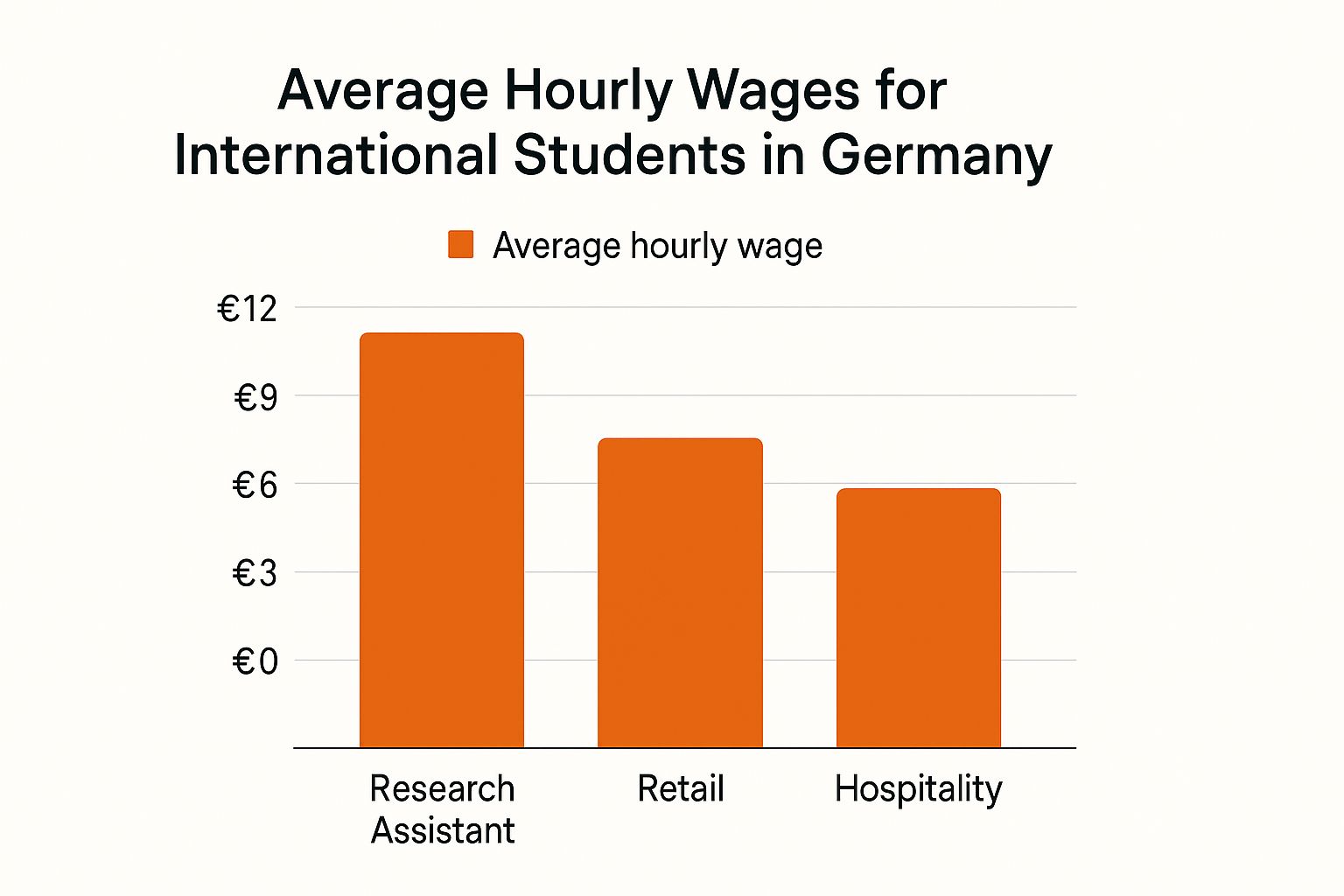Absolutely. Germany is a fantastic place for international students not just to study, but to launch a career. You're allowed to work part-time while you're at university, and there are clear pathways to find a full-time role once you graduate. These jobs are more than just a way to earn money; they’re your first real step into the professional world, giving you hands-on experience and helping you build a network in Europe's strongest economy.
Understanding the German Job Market for Students
Germany isn't just a top-tier study destination—it's a country crying out for skilled professionals, and as an international student, you're in a great position to fill that need. The system is set up to help you succeed. If you're from outside the EU/EEA, you can legally work for up to 120 full days or 240 half days each year without needing a separate work permit. This makes finding a part-time job a very real and achievable goal.
The jobs available go well beyond the usual café or retail work. Many students secure positions as a Werkstudent (working student), which are roles directly related to their studies. German companies love hiring Werkstudenten because it allows them to nurture future talent who can grow with the company.
Why German Companies Hire International Students
German employers are actively trying to fill significant skill shortages, and they see international students as a crucial part of the solution. With a projected deficit of skilled workers on the horizon, your qualifications—especially in high-demand sectors—are more valuable than ever.
Here’s a look at what makes you an attractive candidate:
- The STEM Advantage: A huge portion of international graduates in Germany—over half—major in STEM subjects. In fact, 40% focus on engineering alone. This lines up perfectly with the needs of Germany’s powerful industrial and technology sectors.
- A Global Mindset: Your diverse perspective and language skills are a huge asset. Companies know that this kind of international experience is invaluable in today's global market.
- Scouting Future Talent: Hiring you as a student is a smart, low-risk strategy for a company. They get to train you and see if you're a good fit for a long-term role after you graduate.
This image gives you a rough idea of what you can expect to earn. As you can see, roles that are more specialised tend to pay better.

It’s clear that a position like a Research Assistant not only gives you relevant experience but often comes with better pay than many traditional part-time gigs.
Navigating Work Regulations and Visas
Getting the rules right is key to a stress-free experience. Your student residence permit automatically includes your right to work, but you absolutely must stick to the 120/240-day limit. It's non-negotiable.
For a comprehensive overview of the different visa types and post-graduation options, it's worth reading a detailed guide on German work visa requirements. It will give you a clear picture of the steps you need to take to stay in Germany after your studies.
To make things a bit clearer, here's a quick breakdown of the work permissions for different student groups.
Work Permissions for International Students in Germany
| Student Category | Work Authorisation | Key Limitations |
|---|---|---|
| EU/EEA/Swiss Students | Unlimited work rights, same as German students. | No restrictions on hours. |
| Non-EU/EEA Students | 120 full days or 240 half days per year. | Must not exceed the day limit. Work as a student assistant is often exempt but check with the Foreigners' Office (Ausländerbehörde). |
| Language Course & Preparatory Students | Work is generally only permitted during lecture-free periods. | Requires explicit permission from the Foreigners' Office and the Federal Employment Agency. |
This table is just a starting point. Always double-check your specific situation with the local Ausländerbehörde, as rules can have nuances.
Think about this: Germany will need around 240,000 skilled workers by 2026. With over 50,000 international students graduating each year, you're not just a student—you're a vital part of the country's economic future. This isn't just a number; it's a clear signal from both the government and industry that they are motivated to welcome and integrate international talent like you.
Where to Find the Best Student Job Opportunities

Finding the right job in Germany isn't about blasting your CV everywhere and hoping for the best. That scattergun approach rarely works here. Instead, you need a smart, focused strategy that combines the right digital tools with a bit of old-fashioned networking to uncover the best international student jobs in Germany.
Your first step, and it's a crucial one, is learning the local language of job hunting. Simply searching for "student job" in English will get you nowhere fast. German companies use specific terms for student roles, and knowing them is the key to unlocking thousands of hidden opportunities.
Here’s the vocabulary you need to master:
- Werkstudent: This is the gold standard for student jobs. It refers to a part-time role directly linked to your field of study, so you’re not just earning money—you’re gaining invaluable professional experience.
- Minijob: Think of this as a side hustle. These are part-time jobs where you can earn up to a certain threshold (currently €538 per month) tax-free. They’re great for extra cash but usually won't be directly related to your future career.
- Praktikum: This is the German word for an internship. You'll see two types: a Pflichtpraktikum, which is a mandatory internship your degree programme requires, and a freiwilliges Praktikum, which is one you choose to do voluntarily.
Once you have these keywords in your arsenal, you're ready to dive into the most effective job-hunting channels.
Top German Job Boards and Portals
While you might be tempted to stick to global job sites, the real action happens on German-specific platforms. This is where most local companies, from innovative start-ups to industrial giants, post their vacancies. Your best bet is to create profiles on a few key sites and set up daily alerts.
Start with the big players: StepStone.de and Indeed.de. They are massive in Germany and have extensive listings for Werkstudent roles and internships across every conceivable industry. Their search filters are incredibly useful for zeroing in on jobs in a specific city or sector.
Another fantastic resource is the official "Make it in Germany" portal. This is a government-run site specifically created to help skilled internationals—including students—navigate the German job market. It’s more than just a job board; it’s a one-stop shop for visa information, job listings, and practical advice on German work culture.
Don’t forget about your university's Karriere-Service (Career Centre). This is an often-overlooked goldmine. They have direct relationships with local businesses and often post exclusive job openings on their own private portals that you won't find anywhere else. Go talk to them—it's free and could be the best career move you make.
The Power of Professional Networking
In Germany, who you know can be just as important as what you know. Many of the most desirable roles are filled through referrals and personal connections long before they ever appear on a job board. This is why building a professional network is not just a nice-to-have; it's essential.
For this, you need to be active on LinkedIn and its German-speaking counterpart, Xing. While LinkedIn is globally recognised, Xing is incredibly popular with recruiters and professionals in Germany, especially within more traditional industries. Having a polished, professional profile on both is non-negotiable.
Here’s a simple strategy to get started:
- Optimise Your Profiles: Make sure your LinkedIn and Xing profiles are 100% complete. Use a professional headshot and write a compelling summary that highlights your studies in Germany and your key skills.
- Follow Target Companies: Identify 10-15 companies you dream of working for. Follow their official pages to stay updated on company news, culture, and, of course, job openings.
- Connect with Purpose: Search for alumni from your university or people holding positions you're interested in. When you reach out, don't just send a blank request. Personalise it.
For instance, a simple message can make all the difference. Try something like:
"Hello [Name], I'm an international student at [Your University] studying [Your Major]. I've been following [Their Company]'s work and am really impressed. I'd love to connect and hear a bit about your experience there."
This kind of proactive, genuine outreach shows initiative and can put you directly on the radar of hiring managers, helping you uncover those hidden international student jobs in Germany.
How to Write a German-Style CV and Cover Letter

Think of your application as your first professional handshake with a German employer. Getting it right really matters. The standard German application, which includes a Lebenslauf (CV) and an Anschreiben (cover letter), follows a much more traditional and structured format than what you might be used to. Nailing these details shows you respect the local business culture and immediately marks you as a professional.
When you're looking for international student jobs in Germany, your application documents are your most important marketing tools. They need to be flawless, focused, and tailored precisely to the role you're chasing. Trust me, a generic, one-size-fits-all approach will land your application straight in the "no" pile.
Crafting the Perfect Lebenslauf
The German CV, or Lebenslauf, is a factual, data-driven document, usually one or two pages long and presented in reverse chronological order. A key rule? No unexplained gaps. If you have a break of more than two months, it’s best to explain it briefly—think "Intensive German language course" or "Travel and cultural exploration".
There are a few things that really make a German CV stand out:
- A Professional Photo: While many countries have moved away from this, a professional, friendly headshot is still standard practice in Germany. It should be a high-quality picture of you in business attire. No casual selfies!
- Personal Details: Be sure to include your full name, address, phone number, email, and often your date and place of birth. Adding your nationality is also helpful context, especially for an international student.
- Signature and Date: It’s customary to add a handwritten signature (or a scanned version) along with the current date and city at the bottom. This small detail adds a personal, authentic touch that German recruiters appreciate.
Key Takeaway: Your Lebenslauf should be a clean, factual summary of your history. Think of it as an evidence sheet that proves your qualifications, not a creative essay. Honesty and clarity are paramount.
Mastering the Anschreiben
The Anschreiben, or cover letter, is every bit as important as your CV. This is your chance to inject some personality into your application and draw a direct line between your skills and the company’s needs. Unlike the fact-based CV, your cover letter is a persuasive argument for why you are the best person for this specific job.
Your cover letter needs to be highly formal. If at all possible, address it to a specific person—a quick search on LinkedIn or the company website can often uncover the right contact. And always keep it to a single page.
A powerful Anschreiben should have:
- A Compelling Opening: Ditch tired clichés like "I am writing to apply for…" Instead, kick things off with a statement showing genuine interest. For instance, "Your company's recent project in sustainable engineering perfectly aligns with my thesis research…"
- A Direct Match to the Job: Go through the job description requirement by requirement. For each key point, provide a concrete example from your experience that proves you have what it takes.
- Your Motivation for Germany: Clearly explain why you want to work for this company in Germany. This demonstrates commitment and helps recruiters envision your long-term potential with them.
With a record number of over 405,000 international students enrolled in 2025, the competition is heating up. While Germany is actively trying to retain this talent through initiatives like the DAAD’s Skilled Labour Initiative, you still need to stand out. A perfectly crafted application that respects German conventions is your first and most vital step.
Ultimately, these documents are your entry ticket. If you need personalised feedback to make your application truly shine, you can learn how iKnowly can help you grow your career and skills by connecting with German professionals for 1:1 advice.
Navigating the German Job Interview with Confidence

Getting that interview invitation is a massive win, but your success now depends on how well you understand German professional culture. Interviews here are often quite thorough. Don’t be surprised if you face multiple rounds with HR, the hiring manager, and sometimes even the team you’d be working with.
What often catches international candidates off guard is the directness. German interviewers tend to get straight to the point, focusing on your qualifications, experience, and why you’re a good fit. Small talk is usually kept to a minimum, so a quick transition into the core questions is normal. This isn't rudeness; it's a reflection of a culture that values efficiency.
Understanding Cultural Expectations
Your conduct says just as much as your answers. Showing up late is a major red flag, so always plan to arrive at the office—or log into the video call—at least ten minutes early. It’s a simple act that communicates respect and reliability, two traits German employers value immensely.
When it comes to dress code, err on the side of caution. Business formal is the standard. A smart suit or a blazer paired with conservative trousers or a skirt is your safest bet. It's always better to be slightly overdressed than too casual. It shows you're serious about the opportunity.
A crucial takeaway for any international candidate is to embrace the direct communication style. Expect straightforward questions, and deliver clear, evidence-based answers. Vague platitudes won't cut it; be ready with concrete examples of your skills and achievements.
Answering Common Interview Questions
You'll face a mix of classic interview questions and some specific to your situation as an international candidate. Be prepared to talk about your strengths and weaknesses with honesty. When you discuss a weakness, always frame it as a development area and give a real example of how you’re working to improve.
For international students, a few questions are almost guaranteed to come up:
- "Why do you want to work in Germany?" A generic answer like "it's a great country" won't impress anyone. You need to connect your motivation directly to your career. Talk about Germany's strength in your specific industry, the company's market position, and how this move fits into your long-term professional ambitions.
- "What are your long-term career ambitions?" German companies invest a lot in their employees and want to know you’re in it for the long haul. Explain how this role is a logical step in your professional development and how you envision your growth within the German market.
- "Tell us about a time you worked in a team." Collaboration is important, but so is individual accountability. When you answer, describe your specific contribution to a project's success. Highlight how you worked with others while still taking ownership of your responsibilities.
As you consider your long-term path, you might find yourself drawn to more independent work. For those with specialised expertise, it can be useful to explore options like how to become a consultant on iKnowly to get a sense of different career trajectories.
Asking Your Own Thoughtful Questions
Near the end of the interview, you'll inevitably hear: "Do you have any questions for us?" This is not just a polite formality. It’s a critical opportunity for you to demonstrate genuine interest and intellectual curiosity. Showing up with no questions can signal a lack of engagement.
Come prepared with a few insightful questions that show you've really thought about the role, the team, and the company. This is your chance to turn the interview into a true conversation and leave a lasting, positive impression.
Building Your Professional Network from Scratch
When you’re trying to find your footing in a new country, your professional network is one of the most powerful assets you can build. It’s not just about collecting contacts; it's about creating genuine connections that can open doors to opportunities you’d never spot on a job board.
Think of it this way: finding international student jobs in Germany often comes down to who you know. Some of the best roles are filled through referrals long before they ever get advertised publicly. That’s why you have to treat networking as a core part of your job search, not an afterthought.
Get Out There: University and Industry Events
One of the most straightforward ways to meet people in your industry is by showing up. Your university’s career services team will almost certainly host a Karrieremesse (career fair), where top companies come specifically to recruit students just like you. Don't just wander around collecting brochures. Go with a plan.
You should also keep an eye out for industry-specific events, known as a Fachmesse (trade fair). Whether you're in engineering or IT, these events are perfect for making deeper connections in your niche.
Here’s how to make the most of them:
- Have your pitch ready: Prepare a short, confident introduction. Just your name, university, what you’re studying, and the kind of role you're looking for.
- Do your homework: Pick a few key companies you want to approach and research them beforehand. Knowing what they do shows you’re serious.
- Ask smart questions: Move beyond, "Are you hiring?" Ask about their company culture, exciting projects they're working on, or the skills they value most in new hires.
Remember your value. A 2022 study found that a single group of international students is projected to contribute nearly €15.5 billion more in taxes and social security than they receive in benefits throughout their careers. This highlights the incredible economic contribution you represent. You can read the full findings from the German Economic Institute.
Tap Into Your Alumni Network and Informational Interviews
Don't overlook the goldmine that is your university's alumni network. These are professionals who have been exactly where you are now, and many are happy to help current students find their way. Use LinkedIn to find alumni working at companies that interest you and politely ask for an informational interview.
This isn't about asking for a job directly. It’s about asking for 15-20 minutes of their time to learn. You want to hear about their career journey, what it's like at their company, and any advice they might have for someone starting out.
When you write your message, be specific and respectful. Something like this works well:
“Hello [Name], I'm a current [Your Major] student at [Your University] and I saw on your profile that you work at [Company]. I’m really interested in the industry and would be grateful for the chance to hear about your experience for a few minutes.”
This approach helps you build real relationships, get insider knowledge, and puts you on their radar for when a position does open up. For more tactics like these, take a look at our complete guide on networking in Germany for professional success.
Your Questions About Student Jobs, Answered
When you’re trying to find a job in a new country, a million questions can pop into your head. It’s completely normal. Getting clear answers is the best way to cut through the noise and avoid the common pitfalls many students face. Let's tackle some of the most frequent questions I hear from international students in Germany.
Think of this as your quick-start guide to understanding the rules of the game.
Will I Have to Pay Taxes on My Student Job?
This is a big one, and the short answer is: yes, probably. Just like any other employee in Germany, you'll be expected to pay taxes and social security contributions. But it's not as scary as it sounds, and Germany has a couple of systems that really help students out.
First, there's the Minijob. If you earn up to the current threshold of €538 per month, your income is typically free from tax and social security payments. This makes Minijobs incredibly popular for students who just want to earn some extra cash without getting tangled up in complex paperwork.
If you’re earning more than that—say, in a Werkstudent (working student) position—you'll see deductions for income tax (Lohnsteuer) and social security on your payslip. Your employer handles all of this automatically, so you don't have to do anything.
A Pro Tip: Don't forget you can file a tax return (Steuererklärung) at the end of the year. Many students are surprised to find they get a significant chunk of the income tax they paid back. It's absolutely worth looking into.
Can I Work More Than 120 Days?
For students from outside the EU/EEA, the 120 full-day (or 240 half-day) rule is a hard limit. You absolutely cannot go over it. Doing so is a serious violation of your student visa and could lead to major problems, even deportation. You have to track your days meticulously.
There is one important exception, though. Work you do as a student or research assistant (wissenschaftliche Hilfskraft) directly for your university often doesn't count towards this 120-day limit. The logic is that this kind of work is considered part of your academic life.
However, you must get this exemption confirmed in writing by your local Foreigners' Office (Ausländerbehörde). Never just assume a job is exempt—always get official clarification first. They have the final word.
What’s a Good Hourly Wage for a Student?
Student wages in Germany can be all over the map. What you earn really depends on the industry, the city, and what you can do. The good news is that you can almost always expect to make more than the national minimum wage (Mindestlohn), which is regularly updated.
To give you a rough idea:
- Hospitality/Retail: Jobs in cafes, bars, or shops usually pay around the minimum wage, maybe a little more.
- Administrative/Office Support: You can often find roles paying a few euros more per hour than basic service jobs.
- Werkstudent Roles: This is where the money is. Because these jobs demand skills directly related to your degree, companies pay a premium. It’s not unusual for students in IT or engineering to pull in €15 per hour or even more.
At the end of the day, a "good" wage is whatever helps you live comfortably while building your CV. The roles related to your field of study usually offer the best of both worlds, which is why they're the most sought-after international student jobs in Germany.
Do I Really Need Fluent German to Get a Job?
While being fluent in German will throw open countless doors, it’s not always a deal-breaker. In big international hubs like Berlin, Munich, and Frankfurt, you’ll find plenty of large corporations, tech start-ups, and research centres where the working language is English.
You can definitely find a job with just English. But—and this is a big but—having at least conversational German (think B1 level or higher) makes you a far stronger candidate. It signals to employers that you’re serious about integrating into the culture, and that’s a quality they really value. It simply gives you more options.
Finding the right answers can make all the difference in your job search. If you need personalised guidance from someone who has successfully navigated this path, iknowly connects you with verified German professionals for 1:1 consultations. Get expert advice on your CV, interview skills, and career strategy. Learn more about getting 1:1 expert advice.

Leave a Reply